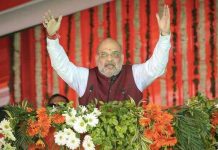[cycloneslider id=”for-manmohans-dream-team-ignorance-is-bliss-2″]
For my fellow conferees I may well have been from another planet when I began to speak. Some 30 of us had collected in Beirut last week from around the world, from as far away as Chile, Scotland, South Korea, Malaysia and Indonesia and, of course, the Arab nations nearby. Deeply committed social and political activists with a track record of working internationally to “free Palestine from Israeli occupation”, as the activist-speak on the issue echoes globally, they had gathered to chalk out the future course of a consolidated solidarity movement for the Palestinians’ long-drawn struggle to have a country of their own in the land of their birth in the Levant.
After several participants had dwelt on the familiar suggestions of strengthening an ongoing BDS campaign (to force boycotts of Israeli goods, divestments in Israeli companies and sanctions against all things Israeli) and of taking out yet more aid convoys to Gaza, the besieged western chip of the Palestinian homeland that the US and Israel force to stay cut off from the rest of the world, I gingerly set about suggesting that we bring India into the picture.
After all, India is now one of the US’ closest non-NATO non-traditional allies. Since forging diplomatic ties with Israel in 1991, India has also emerged as one of the strongest trade and security partners of the Jewish country, buying half of Tel Aviv’s defence exports for $9 billion in a decade. What is the point of campaigning in Europe where governments cannot but toe the Washington line? Why not instead raise a stink in India over the Israeli and US duplicity on Palestine? Indeed, New Delhi once led the global solidarity for Palestine. Why not revive that?
But I could well have been speaking Mandarin. For who has ever heard of India influencing anyone on anything globally, least of all of speaking truth to Washington? Did I seriously believe that the Indian government would be persuaded to not copy-paste the American agenda for West Asia in the column titled ‘Indian foreign policy’? Their disillusion with India was disheartening, yet entirely understandable. In over two decades since the Soviet Union’s fall, New Delhi has inexplicably dumbed down its foreign policy to being no more than a camp follower of the US, displaying little talent for an elegant and nuanced navigation of the international waters.
India’s irrelevance came into starkest display on 24 November when the world’s five biggest powers who are the UN Security Council’s only permanent members — the US, Russia, China, the UK and France — and Germany clinched a historic deal with Iran in Geneva aiming to resolve Tehran’s contentious bid to enrich uranium to harness nuclear power. That the US and Iran could be on their way to detente after 34 years of extreme hostility cannot be overstated. If indeed a more durable agreement emerges from this temporary six-month deal, the new dynamics would dramatically reshape politics in West Asia as well as South Asia, deeply affecting India.
Ironically, the easing of tensions between the US and Iran comes eight years after India began to burn its bridges with Tehran under American-Israeli pressure. Iran’s leadership was stunned, to say the least, in 2005 when India voted in the International Atomic Energy Agency, the world’s nuclear watchdog, to censure Tehran for enriching uranium in a bid to harness nuclear power. Apart from being a display of abject spinelessness, that unforgivable move was also a negation of India’s own commercial (read oil) and geopolitical interests in the conflict-wracked region.
Of course, the Iranians saw it as a betrayal. Old-timers may recall another vote of two decades ago when, at the insistence of Pakistan, an exclusive club of Muslim nations was about to demand that the status of Jammu & Kashmir was a global dispute and should be resolved internationally. The vote nearly went through. Except that Iran, which had excellent relations with India at the time, put out a foot to block the door from slamming shut on India. In the 1990s, India and Iran, Pakistan’s respective neighbours on its east and west, collaboratively backed a clutch of non-Pashtun fighters in Afghanistan’s north, helping them battle the Pakistan-backed Taliban for years before they lost Kabul in 1996. That would be the last India and Iran would team up for anything significant.
The wheel had turned a circle by 2010 when Iran’s Supreme Leader, Ayatollah Ali Khamenei, publicly clubbed Jammu & Kashmir with Palestine, saying both were occupied territories that needed to be liberated. An irritated New Delhi summoned an Iranian diplomat and complained that the statements amounted to Iran meddling in India’s internal affairs. For much of the new century, Iran and India have followed different trajectories in their foreign relations. While New Delhi moved towards the US and away from Iran as well as its former traditional allies such as Russia (the successor State to the Soviet Union), Iran firmed up its relations with Russia and China.
It so happens that, to India’s dismay, Russia and China are ascendant in diplomatic heft while military misadventures in Iraq and Afghanistan and the financial crisis of 2008 have humbled the US, making it far less of a champion ally. What must panic Indian foreign policy mandarins is the unflappable ease with which US President Barack Obama, a self-confessed pragmatist not hemmed by ideology, ignored protests from Saudi Arabia and Israel, two of America’s closest allies who have a pathological hatred for Iran, to join with rivals Russia and China to ink the Iran deal.
It is puzzling that India did not see Obama’s push for normal relations with Iran coming at this juncture. After all, the US president had rather early in his first term explicitly extended an olive branch to Tehran. Once a moderate liberal, Hassan Rouhani, won Iran’s presidency this year replacing the outgoing hardline president Mahmoud Ahmadinejad, Obama was bound to set the wheels in motion. Although these are early days, there can be no doubt that in his remaining three years as president, Obama will seek to further normalise relations with Iran for a number of reasons.
A key compulsion for America is the need to secure peace in Afghanistan from where the US-led military forces will exit next year. Although the westerners have spent billions in training locals as soldiers and police, their competence is far from what would be required to push back any forward thrust by the still potent Afghan Taliban, who are holed out in their sanctuaries along both sides of the AfPak border and continue to receive covert support from Pakistan. As is widely known, Islamabad uses the Afghan Taliban as its insurance policy to create “strategic depth” on its west so it can focus on its border dispute with India on its east.
For internecine violence in Afghanistan to return to anywhere near the levels of the early parts of the past decade would be a huge setback for the US, which wants to ease off on its security concerns in order to focus on rebuilding its economy. Meanwhile, relations between Washington and Islamabad have never been worse in the six-and- a-half decades of Pakistan’s existence than they are today, and the US hardly expects Pakistan to deliver it the peace it wants. And in Afghanistan, a presidential poll in April is already causing jitters all around as there is no clarity on who would succeed the outgoing president Hamid Karzai, and what his politics would be.
Enter Iran. As is being already recognised, any likely entente between the US and Iran at this junction would have an enormous impact on the situation in Afghanistan. Iran is no more keen than Washington to see Islamabad regain the stranglehold it held over Kabul until the Taliban’s ouster from Afghanistan in 2001. Russia and China, which have significantly better working relations with Iran than India has, have boosted their standing in the region by working closely with the US in securing the 24 November deal with Iran. Given that Iran still nurses a sense of betrayal from India, it is unlikely that India would find a prominent place in a scenario that might emerge.
Any hopes that the US might consider a significant role for India in Afghanistan would certainly be misplaced. If Washington gives Israel and Saudi Arabia no quarter, just what can be India’s chances? And while India has allowed a perception to take hold that it is a minion to the US, Iran has held out for over three decades and is now sitting down with the world’s six biggest powers to strike a deal of its own.
India can hardly hope for any help from Israel to find a seat at this table. Israeli leaders are scrambling to figure out its next step, for the latest situation is unprecedented in US-Israeli relations. Before long, and despite its growls, Israel is expected to fall in line. As for Saudi Arabia, the faultlines between the oil kingdom and Iran are multi-layered, not the least of which is the Sunni-Shia divide that has always plagued the Muslim ummah. But as far as India is concerned, it has no more traction with Saudi Arabia than it has with Iran.
In fact, India’s woes in the Sunni Arab world are compounded by its failure to adequately respond to the Arab Spring that spread in the region from January 2011. I remember spending several hours over days at the Indian embassy in Cairo in February 2011, where top diplomats were convinced that the dictator Hosni Mubarak would eventually beat back the tens of millions of protesters and continue to rule Arab world’s most populous nation as he had done for over three decades until then. My feedback from Tahrir Square, where the uprising was centred, did little to convince them of another possibility. But in days, Mubarak was ousted.
India’s position on the Arab Spring has only gone worse since. The recent upheavals in Egypt where Mohammad Morsi was ousted in a coup and jailed was met with a stony silence from New Delhi. The army’s violent campaign against the pan-Arab Islamist group, the Muslim Brotherhood (MB), from which Morsi hails, has angered the Sunni world enormously. But loathe to turn away the anti-MB dictator regimes in most Arab States, New Delhi has continued to practise silence. This stance has won India few friends among Sunnis.
Yet another highly contentious issue on which India has only made murmurs when it could and should have spoken loudly to seize the initiative is the terrible civil war that has raged in Syria for two years. That conflict is now the crucible of the Sunni- Shia conflict, where followers of both sects across the world simply refuse to believe that the other is not the main culprit and perpetrator of violence. In the Beirut conference I attended, this sectarian divide seemed to be the greatest threat to the chances of a consensus. Eventually, a consensus did not emerge.
Finally, the issue of Pakistan. A handshake and a hug between the US and Iran would no doubt make life more difficult for Islamabad, which would be unnerved by the prospects of ceding space to the Iranians in Afghanistan. After making statements conciliatory towards India, Pakistan pm Nawaz Sharif went on the offensive this week, suggesting India and Pakistan could go to war yet again if the dispute over Jammu & Kashmir wasn’t resolved. That, of course, is posturing for consumption by the domestic political constituency in Pakistan. But it also underlines the anxiety that the latest Iran deal is causing in that country. Having appointed a new army chief just last week, Sharif can hardly be seen to be making life easy for India vis-à-vis Afghanistan.
But Islamabad has a card that puts it ahead of India. And that card is China. Precisely to box in India, China has deliberately courted Pakistan for long and the two have worked out a mutually beneficial partnership to outwit India in South Asia. It was indeed this growing relationship that had in large part spurred India in the first place to cross the oceans and build a big umbrella relationship with the US as a counterpoint to China in this region.
But now, the US has revealed its preoccupation with itself, which has little room to include any concern for India. There are few voices to be heard in India’s favour in West Asia as hardly any recognise India as a trustworthy friend. Russia and China are both at a high table where India has not been invited and won’t be, not on par anyway.
And yet, there I was in Beirut, trying to convince people that India could make a difference on a key issue in West Asia. No wonder no one was buying it.
ajit@tehelka.com












